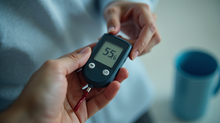Guest blog-Can Diabetes Type 2 Be Reversed? Experts Answer (Part 2 of 4)
- Jasmine Burns
- Sep 13, 2017
- 6 min read
(Due to the length of this article it is being presented in 4 parts-Maureen)

It is the burning question most, if not all, people with diabetes type 2 have: can my diabetes be reversed?
There is so much information, thousands of articles, home remedies that promise readers the ultimate chance to reverse their diabetes. It sounds too good to be true.
However, as with all things on the net and with our health, we must be wary of what we read and what is fed to us as information. Most articles recommend healthy eating and exercising as a way of reversing your diabetes.
These are two lifestyle changes that are easy to do if you put your mind into it. Does it work though? If it does, how can you go about doing this or where should you start? We reached out to 28 experts in the field who spilled the beans to us about the reversal of diabetes type 2 and whether it is a myth or a reality. To find out more, please keep reading.
8. Michele Bedwell, MS RD CDE
Type 2 DM can be reversed in some patients who choose to have bariatric surgery. Lifestyle changes certainly can control blood sugars with little to no medications but usually do not reverse diabetes due to ongoing decline in beta cell function.
If patients are motivated to make lifestyle changes, I usually encourage them to consume a lower carb meal plan, adequate protein at each meal, large volumes of low carbohydrate vegetables, and at least 150 minutes per week of exercise (a combination of resistance and cardio) for maximal benefit.
These changes can decrease insulin needs, allow for weight loss, and improve insulin sensitivity. Hopefully, there will be more breakthroughs in diabetes as we learn more about the microbiome, GLP1, and other gut factors.
9. Lisa Stollman, MA, RDN, CDE, CDN
After you are diagnosed with diabetes, by following a healthy lifestyle, which includes a healthy diet along with exercise, you may be able to decrease your blood glucose levels to within normal range. Utilizing SMBG (self monitoring of blood glucose), you can see how different foods, as well as meals, influence your blood glucose levels. Doing SMBG along with a healthy diet and exercise is key to getting your diabetes under good control.
Although your blood glucose levels can appear in the normal range, this does not mean that your prior history of diabetes won’t return. Type 2 diabetes can go into remission with lifestyle management. But the remission stage can easily be reversed if you don’t stay on track with your healthy lifestyle.
If you would like help lowering your blood glucose levels with diet, make an appointment with a Registered Dietitian Nutritionist (RDN). Visit www.eatright.org to find a RDN in your locale.
10. Jane Eyre Schuster, RD, LD, CDE
There are many studies showing that by initialing lose 5% of current body weight and getting 150 minutes of exercise weekly can and do return many folks’ blood glucose levels back into a normal range. However we must continue these actions as lifestyle changes, not just a means to an end. The human body is incredible forgiving and will always move towards health when given the opportunity to do so.
Cutting out the refined, processed starches and sugars, BG rebound into a normal range very quickly. My experience is when people begin to be more conscious of their food intake and physical activity, which happens immediately after being diagnosed with pre diabetes or diabetes, they begin to make better food choices and cut out the foods they know are not healthy.
Most of those foods are refined, processed starches and sugars. Lots of diets place people on a restricted plan that doesn’t allow the refined, processed starches and sugars, and people lose weight, regain good BG control and feel better. However, in most cases, the weight comes back and weight creeps up and BG begins rising again due to the inability to sustain many of these diets.
Lifestyle changes with diet, exercise and mental health over time are the most powerful tools to “reverse” diabetes. Being conscious of what we are doing gives us the opportunity to make conscious decisions in the moment and move our food choices up to the top of our priority list rather than the reaction and guilt after the moment.
WE MAKE BETTER CHOICES WHEN WE ARE CONSCIOUS OF WHAT WE ARE DOING! Learning how to keep our diet and exercise habits at the top of our priority lists is the challenging part. Because with the speed of light, it inevitably ends back down on the bottom of our priorities. There is where diabetes hangs out and waits for us to return.
11. Amanda L. Gilbert, RN, MSN
From my professional experience as an inpatient diabetes educator, many patients are able to reduce or stop their diabetic medications through lifestyle changes, such as diet and exercise. Through these adjustments their A1C improves, they lose weight, and do not require the same interventions as when they were diagnosed.
Many of my patients with several comorbidities elect to have weight loss surgery, such as gastric banding, in order to lose the amount of weight needed to improve their diabetes, blood pressure, cholesterol, and other risks that follow obesity.
However, once someone has a tremendous improvement and no longer needs to take diabetes medications they do not need to assume it is “gone for good.” Different factors can cause their glucose to rise again, such as gaining weight or not following a diabetic diet.
Therefore, once a person has been diagnosed with diabetes they need to always check their glucose at home and follow-up with their PCP to have their A1C monitored regularly.
12. Carole Edwards, RN, BSN, MA, CDE
Can We Reverse Type 2 Diabetes?
This is a great question that is somewhat controversial in the diabetes world. We all know the person that was on multiple diabetes medications, lost a moderate to significant (10-20% weight loss) amount of body mass, that now no longer requires medications for his/her diabetes.
This is truly a cause for celebration. For all practical purposes, after the weight loss and glucometer readings are in the normal range & the A1c reading is in the normal range, this person has effectively reversed their diabetes.
Conversely, it must be understood that this person has an increased risk of developing diabetes if the weight gain sneaks back on. I believe this person needs at least a yearly A1c lab test to make certain that he/she hasn’t had a return of higher blood sugars.
If the person has reverted to old eating habits and/or decreasing physical activity and gaining weight, the A1c should be repeated sooner than once yearly.
The argument has been that the Type 2 Diabetes isn’t really reversed, but in my mind’s eye, as long as the person stays the same weight & physical activity level, it is reasonable to conclude for the time-being that, indeed, the disease is reversed. That person needs to be aware that they have accomplished an amazing achievement.
As health promoters, we need to support this person with their weight loss journey. Knowing and seeing all the comorbidities and complications that accompany diabetes, as a diabetes educator, I believe there needs to be more treatment studies devoted to weight loss, obesity treatment, weight loss surgeries, & weight loss pharmaceuticals.
13. Marina Chaparro, RDN,CDE, MPH
Type 2 diabetes can be delayed and in many instances reversed, but the moment a person stops following a healthy lifestyle and goes back to unhealthy habits, the risk prevails. The number one risk factor for type 2 diabetes is weight. Over 80% of people who develop type 2 diabetes are overweight or obese.
That is why losing even 5% of your body weight can help delay the onset of type 2 diabetes. It’s important to note that, certain lifestyle modifications such as exercising regularly and eating a balanced diet can delay the onset of type 2 diabetes; however, the exact reversal is not a sure thing.
Type 1 diabetes is not reversible as it is an autoimmune disease, independent of weight and eating habits. The exact cause of type 1 diabetes is not known.
Some individuals like Hispanics, African Americans have a higher genetic susceptibility of developing type 2 diabetes, regardless of weight. Despite this, engaging in healthy habits from the start will only improve your quality of life.
14. Janice Baker, MBA, RD, CDE, CNSC, BC-ADM
As with many questions about diabetes, there are several factors to take into consideration. One is how early into diagnoses efforts at managing diabetes begin.
At early stages of diabetes, preferably during the pre-diabetes stage, lifestyle efforts such as changes in eating and activity habits may make a significant difference in insulin resistance and slow down or possibly halt progression to type 2 diabetes.
As time progresses, persistent hyperglycemia along with other metabolic factors such as beta cell dysfunction, lipo/glucotoxicity, fatty liver, and sarcopenia may decrease the risk of reversal. Hereditary or autoimmune factors (ie LADA, often referred to as type 1.5 diabetes) may also reduce the probability of diabetes reversal.
Frailty, immobility, medications, coexisting medical conditions may also adversely influence glycemic control.
Thus it is important to individualize therapies, including medications, lifestyle recommendations and goals of care to meet individual needs.
I mention to my patients that diabetes may be put into “remission” however it may resurface as metabolic/lifestyle or other factors change.



































Comments